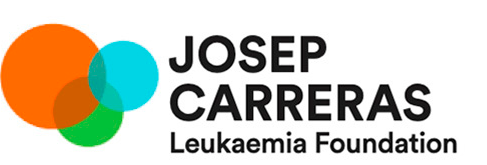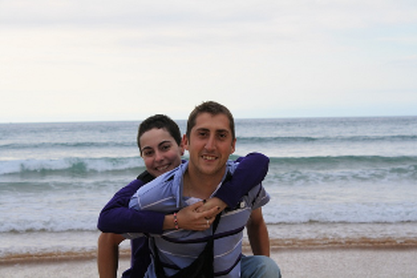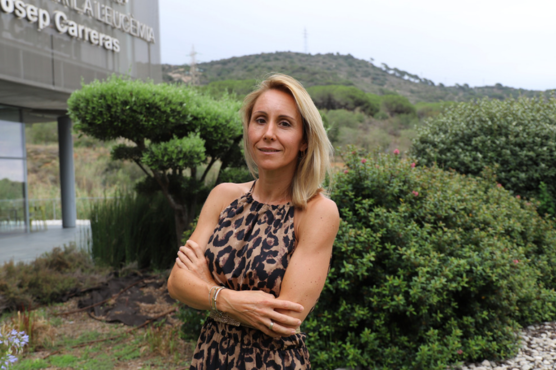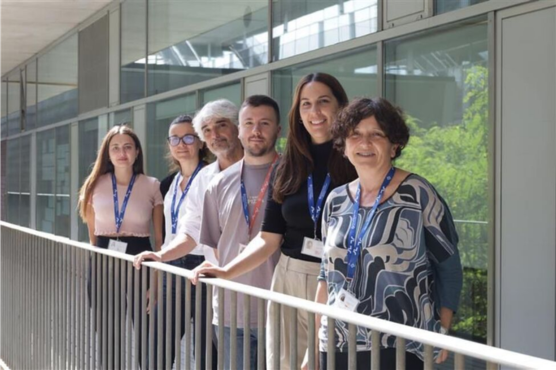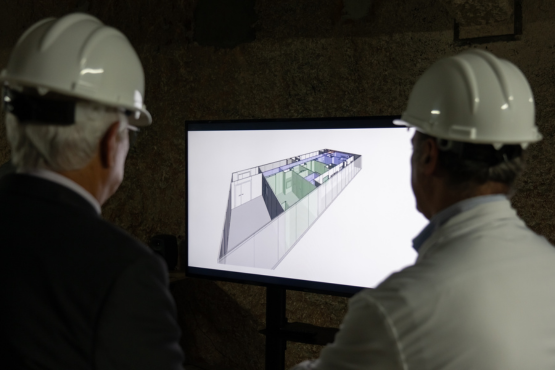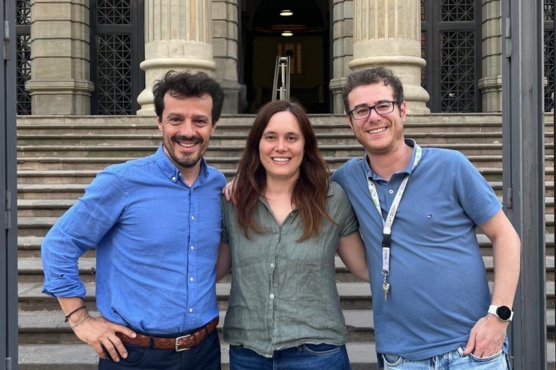Interview with Olaia, leukaemia former patient who underwent a bone marrow transplant from a donor.
“To my donor, what would I tell him?… I do not know who he is and I never will, but just thinking about him and I start to cry… There are no words to describe what you can feel for someone that has given a small part themselves to save the life of somebody who they have never met”.
This sentence is addressed to a person from Germany who will never hear it. He was the one who saved Olaia’s life, a 29 year-old girl from Bilbao who suffered from leukaemia. In February this year, Olaya underwent a bone marrow transplant to cure the acute myeloid leukaemia she was suffering. As her older sister, Nerea, was not compatible with her, the José Carreras Foundation through the Bone Marrow Donors Registry (REDMO) started a search for a compatible donor at an international level and… we were able to locate a suitable donor in Germany!

Olaia, with her boyfriend, Alex.
We wanted to speak with her to know how she lived all this process and what her plans are for the future.
– What crossed your mind at the moment of the diagnosis?
Olaia: My first thought was ‘Why me? Why now?’ and I took my boyfriend’s hand. It had been 5 months since we had started living together and I couldn’t believe it. I thought I still hadn’t had time to enjoy my life living with my partner, that I would never get married… I don’t know, too many things cross your mind. After the diagnosis, there is time to talk about the side effects: you will go bald; you will possibly go sterile… These are very hard things for a 28 year-old person.

Olaia, a year before the treatment
– What was your treatment like?
Olaia: Before the chemo treatment, I was treated for freezing ovules. This involves treatment once a week with a one day injection to stimulate ovulation. It lasts 10 days and I only felt a discomfort the last day as I had more than 10 ovules in my ovaries and I felt really “heavy”. The ovules extraction was so fast that I hardly even noticed it. They put me under a light sedation and, by the time I woke up, I was in the room again. I didn’t even have to stay in hospital. There were no more than 3 hours since I went in to when I went out. Thanks to the IVI (Infertility Valencian Institute), which donates some of its annual savings to help women with cancer, this treatment was not an expense at all to me. I want to thank all the team at the IVI for all they do for us.
One week after the ovule treatment, I went to hospital for the first session of chemo. It was 7 days straight, 24 hours a day. During this week I didn’t have any symptoms and I thought I was one of those lucky people who do not suffer any side effects. But the day after I finished the chemo was one of the worst. I started with the stomach cramps and I even begged to be taken out of hospital because I couldn’t stand that pain. I think at that moment I started with the morphine. I started with the isolation, I mean, locked up in a hospital room because my defenses lowered and I was in danger of being infected by any bacteria or virus. The worst thing for me was not being able to hug or kiss and also that people had to go inside my room with a mask, as if I was a “weirdo”. I couldn’t have food like salads, or hamburgers. Even with those precautions, I caught a bacteria that lowered my hemoglobin t0 3,7 when the minimum is 12,1. I was using an oxygen mask for several days, as I couldn’t breathe properly. In the moments I was using it I was really scared and needed someone to hold my hand. I didn’t mind being isolated and not being able to be touched by anybody, but I needed to feel someone close to me, to feel that I was still alive and that someone was holding me on to this life.
I needed seven blood bags to recover from that bacterium. Apart from that, I also had the typical symptoms: shivering, temperature, vomiting and ulcers in my mouth… After three weeks my defenses rose and they let me go out of hospital to my house for 10 days to rest and disconnect. During these days the Barakaldo Festival took place, near to where I live, and I learnt how to enjoy them during the day time, because at night I didn’t even have strength to be stand. At this Festival I met Anthony Blake in a pub. I do not know why, but he came to talk to me. I have never believed in such things, but the first thing he told me while holding my hand was: “What happened to you”? And I answered: “I am sick”. And he told me “you are not sick, you are in a process of being cured. He told me that staring at me and I can tell that I have remembered that penetrating gaze many times. Then, he told me that I had to stay mentally strong and to feel like fighting, as he knew from some studies they had done that the same treatment could take a month more to be effective in a person who was mentally “weak” than in a person who had the strength to fight.
I went back to hospital for the second chemo that could be an induction or a consolidation depending on the results of my lumbar puncture. If the blasts were lower that 5% (full remission) I would be “saved” from an induction chemo. It was one of the happiest days in my life when they told me that the blasts were lower than 1% and the chemo was working really well. The second session was light (although I continued with temperature, shivering and vomits) till the last days when I “broke my backside”, as I called it laughing. I started having some internal and external haemorrhoids, damn!… How painful they were! But 25 days later I was home resting and getting stronger for the third session. One of my passions is soccer, specifically Athletic Bilbao football team. For me it was a surprise that the doctor allowed me to go to the ground, but I had such a big pain in my backside and I was so tired that I couldn’t make it.

At Christmas 2010, one month before the bone marrow transplant
This chemo session was going to be the last one at the Basurto Hospital in Bilbao and after that I would have the Auto-transplantation at the Cruces Hospital in Barakaldo. The beginning of this session was soft, but after the 20th day when my bone marrow was supposed to start working, I was still with zero defenses. The doctors told me that they were going to start looking for a donor, just in case things got complicated, but I thought it was not going to be necessary. I thought the Auto-transplantation would work. In the meantime, my mouth got worse, so that I had to have soups and milkshakes for 4 weeks. And only when I could manage it because putting something into my mouth was an impossible task. 30 days later and still with zero defenses, I couldn’t mentally stand the isolation anymore. Any time the doctor told me my defenses weren’t rising I started to cry. Mentally it was very hard because I even thought that the doctors were hiding something from me. After two months of isolation, they improved just enough to discharge me from hospital. They gave me two options: if my bone marrow continued working and generating more defenses the treatment would be over. I wouldn’t even have the Auto-transplantation as the last chemo was very strong and I wouldn’t need it. On the other hand, I could have a non-related transplant.
Two months later the good piece of news was that they had found a donor. I now understand that it was a very good piece of news to find a donor so compatible, but at that moment, I cried and cried out of fear for the transplant and the post-transplant, as for me that was the “bad” piece of news.
During those two months I was waiting to see if my bone marrow was working or not (as I was not waiting for a donor). It was long, I had a check-up every week and I needed a lot of blood and platelet transfusions to maintain myself. I was really tired and dizzy…
– How is it for young people during the sickness processes? How can you better spend the day-to-day in hospital? What would you suggest?
Olaia: I was very lucky because I was never alone, only at nights. It is important to have someone around, and also, different people. If you are always with the same people you might get tired of them or their conversations and you could argue for no reason. Someone told me that you also have to take care of the carer, and they were completely right. So the first point for me has been the variety of people that came to visit me and also not to let me be alone, because when you are alone you think too much and being mentally “strong” helps a lot.

Alex, Olaia’s partner, during the isolation
Another plus about the company is that it makes you feel useful. Waking up in the morning in hospital and thinking I had “something” to do, it helped me a lot mentally. I can give some examples. I fixed my sister’s mobile phone and put some nice photos on it that she liked very much. I made a photo album for a friend of mine, with the photos of her 1 year old daughter (as I did it with my laptop I could do it in hospital). Now I am making some needlework bibs for her. Another friend of mine gave me the stuff to make clothes pegs, which are really in fashion nowadays for jumpers. What is nice is that these things I made them for someone and it made me happy to think about the moment when I would give them to them. At least, while I was doing these things I was not thinking I was sick. I really like to give surprises, but it is also good to keep ourselves busy and that people ask you to do something for them.
Other people just came to play cards or other games or to watch a film. The idea is not to be monotonous. You also appreciate a lot the small gestures. The gift I liked the most was just a cap. When I shaved my head (it is not something easy to deal with) they gave me a lovely pink cap, which was not huge, but for me it was very useful in hospital.
And there are also other days when you do not feel like getting up or talking. We also need to cry, to have our space… but not too much, ok? They have to let us unburden ourselves, better talking with someone: family, friends, whoever better than being alone. But if someone does not feel like talking, give them “some” time.
– How is the transplant?
Olaia: The transplant… what can I say about the transplant? You have one side effect after another. I had the transplant at the Valdecilla University Hospital in Santander. Before starting with the chemo and after fitting a central tract, they gave me one day “off” and they let me go out for one day. My boyfriend Alex, who was isolated with me during the transplant, and I went to the Sardinero beach, which is on the other side of Santander, just to see the beach. Beaches and Athletic football team are my passions. All the days before a chemo session, Alex took me to the beach in Getxo, just to walk near the beach, as I couldn’t step on the sand or go into the water. I also had a chocolate cake (I have a weakness for them) that tasted great. Since then I haven’t had any more of them as my stomach is not still well.

Olaia, during her treatment
After the beach and the chocolate cake different types of chemo came. I particularly remember one which was “vitamin of rabbit”. Up to this one I wasn’t that bad, but with this one the vomits and stomachaches started. It was exactly on my Birthday day, the 29th of January, and they lasted weeks after the transplant. In fact, my stomach has not recovered yet. I had the transplant on the 2nd of February. I stayed all day in bed, as I didn’t feel like getting up and I didn’t have the strength either. For me, taking a shower was a torture, even taking into account that Alex was my stick, and he did everything for me.
I was in the ICU for 3 days quite “off-color” as my blood pressure went down to 3 – 5 and they couldn’t raise it. After taking a lot of antibiotics and getting really bored in the ICU I was only thinking of being fine for that Monday as Athletic was playing and it was a “must” to watch it on the TV. And I did it! They took me back to my room on Sunday evening. I think, or at least it worked for me, that every day we must have a purpose. Days in hospital are really hard and boring, but every day when I woke up I wanted to do something. And if I didn’t do it, I could always do it the day after, but at least I aimed to do it and I woke up thinking I had something to do. After being in the ICU for a week I was discharged. The first weeks at home were not easy, as I was vomiting all the time. After that I had a rash in my skin that itched, I lost my nails, the stomachaches… Now I even have hair and I am not wearing the wig. It is a big release because you do not see yourself as “sick” anymore when you look in the mirror, although it will still take time to have my hair as it was before.
– What would you tell to a person who is thinking about registering as a donor?
Olaia: I understand that people can be scared of being a bone marrow donor, but the truth is that it is very easy. I encourage people to think: What if I can save a life? What if anybody can die for not spending 2 or 3 days on it? What if your bone marrow is compatible with the one of many other patients that are waiting for it?
– What would you say to your donor?
Olaia: To my donor, what would I tell him?… I do not know who he is and I never will, but it is just thinking about him and I start to cry. There are no words to describe what you can feel for someone that has given a small part of themselves to save the life of somebody who they have never met”. Thank you very much for giving without expecting anything back. What a coincidence that in my last trip abroad in February 2009 I went to Germany and in February 2010 a German saves my life. Thanks, thanks a lot! And even if I thank him all my life, I will have never thanked him enough. I am alive thanks to him and there are a lot of people alive thanks to many donors. How would you feel if someone would be a live thank to you?
– What do you ask for the future? What are your current plans? Have your values and hopes changed after being diagnosed?
Olaia: Since the beginning of my treatment I had one thing in mind: my wedding. We had planned to get married in 2012, but we never fixed the date. When they told me I had leukaemia, my first thought was I would never get married. As they were telling me there was a solution for it, my only thought was: I had to make it to my wedding. I even made a list of the guests in hospital. The days when I was feeling worse I thought I had to make it to my wedding; or at least to the wedding of Igor and Sandra, who are very special friends. I made that one. And, mine? For now, the transplant is working perfectly and that makes us think that everything will go fine and I could get married one day.

Olaia and Alex, looking very smart, in the wedding of their friends Sandra and Igor
From your point of view many things change when they inform you of your diagnosis. Before I used to be overwhelmed with “nonsense” and I got nervous very fast. Now I have learnt or I am learning to live daily and to assimilate things when they come. You learn to value simple things like going into the street (a total of 5 months isolated), a person’s hug, eating a hamburger…
I want to thank all the doctors and nurses of the Basurto and Valdecilla Hospitals. I would not be here now without them. And, specially, I thank Dr. Richard, my doctor in Valdecilla, for everything he did for us, mainly in the difficult moments. I cannot forget to be grateful to all the people who have been close during the treatment, encouraging and supporting, cleansing and feeding me, being my rock both physically and mentally… thanks my family, my boyfriend’s family, my friends and mainly my boyfriend Alex. THANK YOU. ESKERRIK ASKO.
Find out more patient’s testimonies HERE

